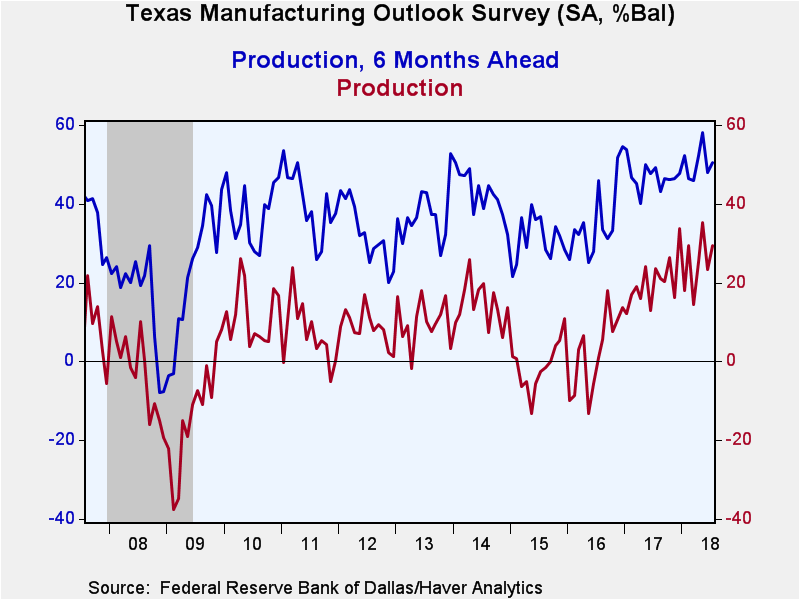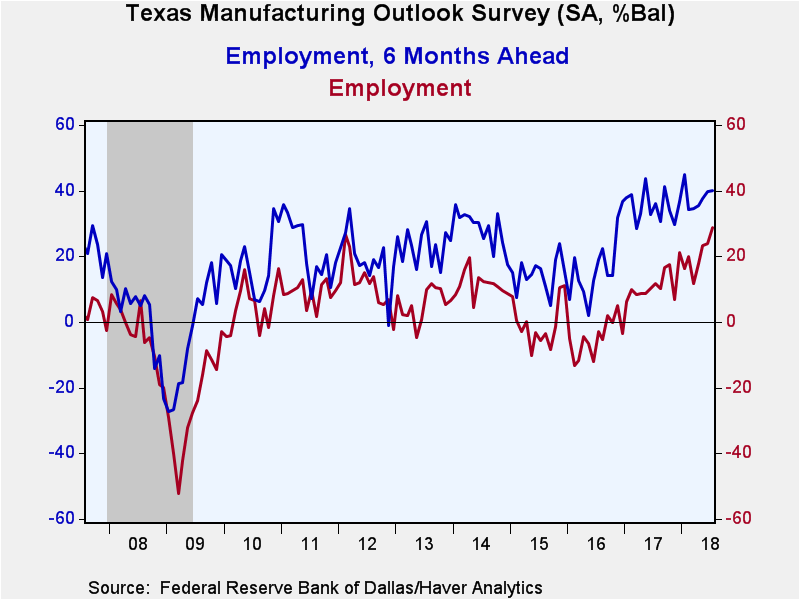 Global| Jul 30 2018
Global| Jul 30 2018Texas Factory Sector Index Eases
by:Tom Moeller
|in:Economy in Brief
Summary
The Federal Reserve Bank of Dallas indicated in its Texas Manufacturing Outlook Survey that the General Business Activity Index declined to 32.3 during July after increasing to 36.5 in June. The latest level remained near the [...]
The Federal Reserve Bank of Dallas indicated in its Texas Manufacturing Outlook Survey that the General Business Activity Index declined to 32.3 during July after increasing to 36.5 in June. The latest level remained near the expansion high.
Movement amongst the sub-series was mixed. The growth rate of new orders and delivery times declined. On the labor front, employment increased to the highest level of the recovery, and the workweek series also rose. Wages and benefits improved to almost the recovery high.
The index for finished goods prices received eased, but remained near the expansion high. The raw materials price measure also remained firm. The cost of labor rose as the wages & benefits index increased to the highest point since February.
The index of expected business conditions in six months rose m/m. Movement amongst the sub-series was mixed. The future production series strengthened along with shipments, but orders growth declined. Future employment was stable, after having moved roughly sideways for a year. Future wages & benefits remained near the recovery high.
Each index is calculated by subtracting the percentage reporting a decrease from the percentage reporting an increase. When all firms report that activity has increased, an index will register 100. An index will register -100 when all firms report a decrease. An index will be zero when the number of firms reporting an increase or decrease is equal. Items may not add up to 100% because of rounding. Data for the Texas Manufacturing Outlook can be found in Haver's SURVEYS database.
| Texas Manufacturing Outlook Survey (SA, % Balance) | Jul | Jun | May | Jul'17 | 2017 | 2016 | 2015 |
|---|---|---|---|---|---|---|---|
| Current General Business Activity Index | 32.3 | 36.5 | 26.8 | 17.3 | 20.6 | -8.9 | -12.5 |
| Production | 29.4 | 23.3 | 35.2 | 23.5 | 20.2 | 2.4 | -1.0 |
| Growth Rate of New Orders | 17.0 | 22.2 | 26.5 | 13.9 | 11.4 | -7.3 | -11.8 |
| Number of Employees | 28.9 | 23.9 | 23.4 | 11.6 | 11.4 | -4.9 | -0.4 |
| Wages & Benefits | 32.4 | 31.4 | 24.3 | 21.0 | 22.2 | 17.6 | 16.5 |
| Prices Received for Finished Goods | 22.9 | 26.2 | 20.5 | 6.0 | 12.7 | -1.6 | -8.5 |
| General Business Activity Index Expected in Six Months | 36.2 | 35.9 | 30.0 | 31.3 | 34.5 | 8.9 | 4.1 |
| Production | 50.6 | 47.9 | 58.0 | 49.1 | 46.8 | 35.8 | 31.1 |
| Growth Rate of New Orders | 35.1 | 37.7 | 37.7 | 32.8 | 37.7 | 24.3 | 20.7 |
| Number of Employees | 39.9 | 39.8 | 37.6 | 36.2 | 35.2 | 16.8 | 14.7 |
| Wages & Benefits | 53.2 | 53.2 | 50.6 | 45.9 | 43.4 | 34.8 | 33.2 |
Tom Moeller
AuthorMore in Author Profile »Prior to joining Haver Analytics in 2000, Mr. Moeller worked as the Economist at Chancellor Capital Management from 1985 to 1999. There, he developed comprehensive economic forecasts and interpreted economic data for equity and fixed income portfolio managers. Also at Chancellor, Mr. Moeller worked as an equity analyst and was responsible for researching and rating companies in the economically sensitive automobile and housing industries for investment in Chancellor’s equity portfolio. Prior to joining Chancellor, Mr. Moeller was an Economist at Citibank from 1979 to 1984. He also analyzed pricing behavior in the metals industry for the Council on Wage and Price Stability in Washington, D.C. In 1999, Mr. Moeller received the award for most accurate forecast from the Forecasters' Club of New York. From 1990 to 1992 he was President of the New York Association for Business Economists. Mr. Moeller earned an M.B.A. in Finance from Fordham University, where he graduated in 1987. He holds a Bachelor of Arts in Economics from George Washington University.
More Economy in Brief
 Global| Feb 05 2026
Global| Feb 05 2026Charts of the Week: Balanced Policy, Resilient Data and AI Narratives
by:Andrew Cates










